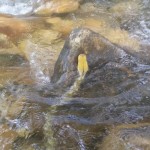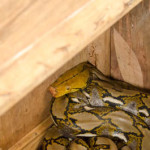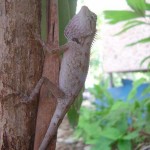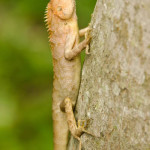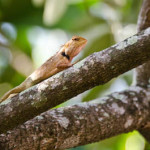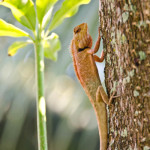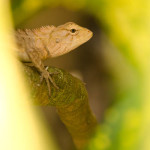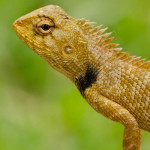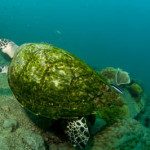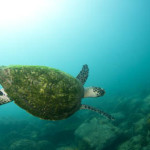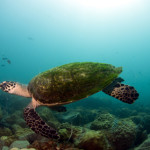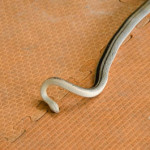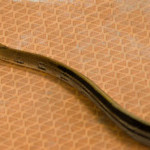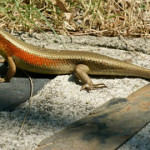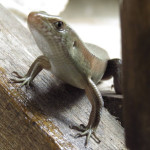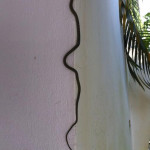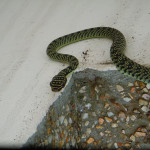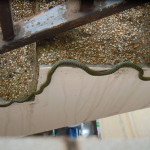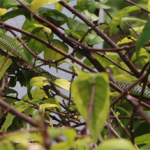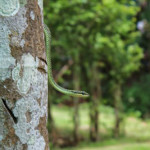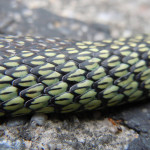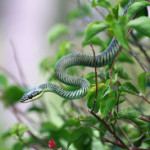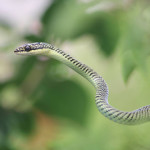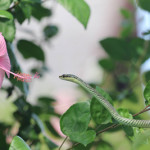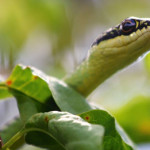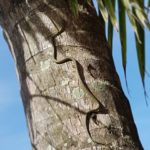Reticulated Python – Python reticulatus
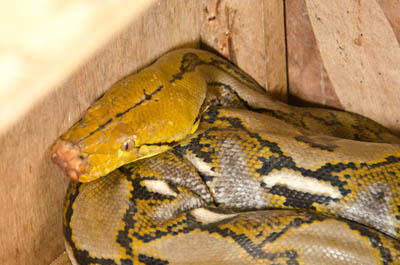
Image David Vinot
Last Observed: February 2015
Observed By: David Vinot, Stian Giordano Dahler
The reticulated python is the longest snake on earth. Another Koh Chang animal record. The largest example ever measured was a huge 6.95 metres, although there are many unconfirmed reports of much larger specimens (in fact I’ve seen a picture of one on Koh Chang that looked way longer than that).
They are non-venomous, catching their prey through winding their powerful bodies around them and literally squeezing the life out of them. Although there are plenty of anecdotal stories about them attacking humans there is little evidence and they aren’t considered to be areal threat to people. They may go for very long periods without feeding and conserve energy.
They are named after the net-like reticulated pattern of light and dark colouration. This is actually a very effective form of camouflage.
Reticulated Python Wikipedia
Image Copyright Stian Giordano Dahler
Oriental Garden Lizard – Calotes versicolor
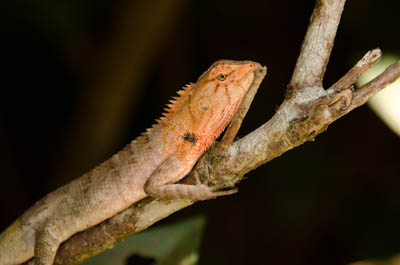
Image: David Vinot
Last Observed: November 2015
Observed By: David Vinot, Heli Pohjolainen
The oriental garden lizard is an insect-eating lizard that is common on Koh Chang.
Their coloration is very variable and males get a reddish/pink marking around the throat during mating season.
They grow up to 37cm in length including the tail and sport two distinct sets of spines as a crest on their neck and back.
Oriental garden lizard Wikipedia
Image Copyright Heli Pohjolainen
Olive Tree Skink – Dasia olivacea
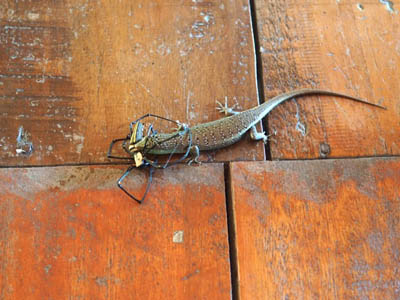
Image: David Vinot
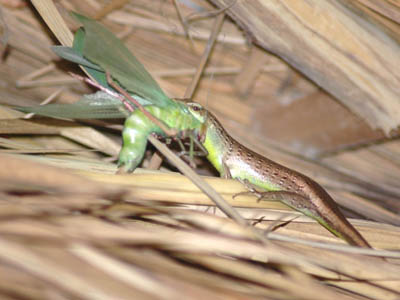
Image: David Vinot
Last Observed: February 2015
Observed By: David Vinot
As can be see from the pictures the olive tree skink is a hungry creature and feeds voraciously on live insect prey.
They live in tropical environments in Southeast Asia below 15 degrees north. Here in Koh Chang we are 12 degrees north.
Olive tree skink Wikipedia
Monocled Cobra (Naja kaouthia)
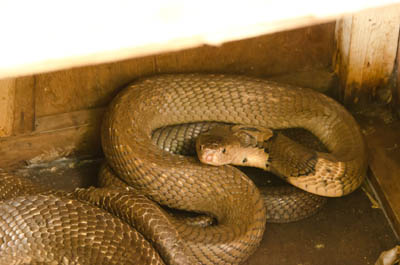
Image: David Vinot
Last Observed: February 2015
Observed By: David Vinot
The monocled or monocellate cobra is a snake with a widesoread distribution across South and Southeast Asia. It has various colorations but is characterised by a black spot on either side of the underside of its hood. They can reach a length of 1.5 Metres.
They can adapt to a variety of habitats but generally prefer a habitat with proximity to water such as mangroves or paddys fields.
IT IS VERY POISONOUS. The monocled cobra causes the most snake related fatalities in Thailand.
Monocled Cobra Wikipedia
Hawksbill Sea Turtle (Chelonia mydas)
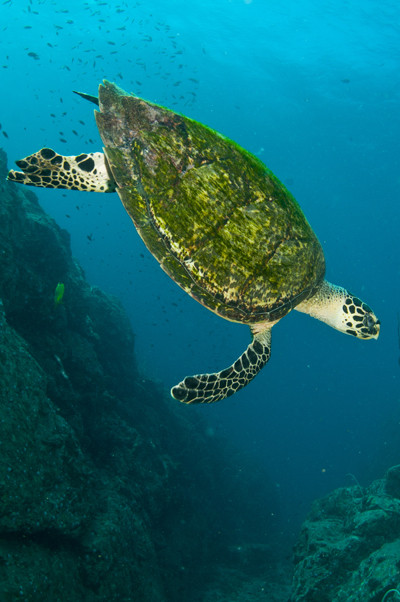
Image Copyright Jonathan Milnes
Last Observed: February 2010
Observed By: Jonathan Milnes
The hawksbill sea turtle is a large sea turtle that inhabits tropical oceans all around the world. It is listed as endangered and in most countries it is illegal to collect, harm or kill them. Not that you’d want to – they are peaceful creatures and swimming with one is a rare privilege.
Like most turtles the hawksbill turtle migrates very long distance between feeding grounds and hatching beaches, which they are able to relocate with uncanny precision. They can live for up to 80 years.
Hawksbill Sea Turtle Wikipedia
Image Copyright Jonathan Milnes
Image Copyright Jonathan Milnes
Image Copyright Jonathan Milnes
Copperhead Rat Snake (Canthosaura armata)
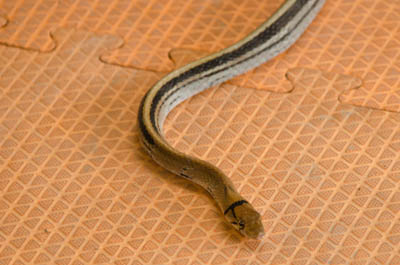
Image David Vinot
Last Observed: February 2015
Observed By: David Vinot
The Copperhead Rat Snake, A.K.A. Radiated ratsnake and Copper-Headed Trinket Snake is a nonvenomous snake from the colubrid family.
It has distinctive lengthwise black and beige markings.
Copperhead Rat Snake Wikipedia
Common Sun Skink (Eutropis multifasciata)
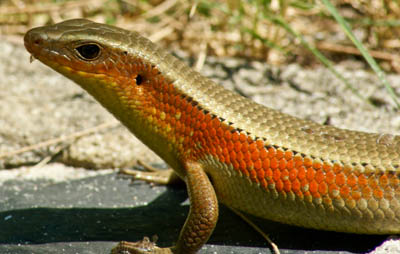
Image: David Vinot
Last Observed: November 2015
Observed By: Rinske Hackmann, David Vinot
This skink is characterised by its brightly coloured side markings. It has loads of names as well; Easrt Indian Brown Mabuya, Many-Loned Sun Skink, Many-Striped Skink and Golden Skink. It is found all over South, Southeast and East Asia
Common Sun Skink Wikipedia
Golden Tree Snake (Chrysopelea ornata)
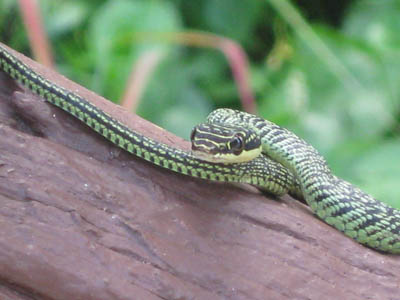
Image Copyright Lindsay Seggie
Observed: November 2018
Observed By: Lindsay Seggie, Tijl Adriaen, Laszlo Halsz, Perry Stevens, Robert Poser
The Golden Tree Snake isn’t golden. Who names these animals? Instead it has a characteristic black and green mottled colouration. In fact in certain other habitats it apparently has some orange markings as well – but not here on Koh Chang where it is one of the most commonly sighted snakes.
Oh, and it can fly! Well that’s not strictly true but it able to leap from trees and glide in a controlled fashion. That would be a thing to see. They flatten their bodies when gliding and form a U-shape on their underside which traps air and acts as a parachute.
The snake isn’t particularly large with a maximum lenth of 130 centimetres. And yes, it is poisonous, but only very mildly, and they are not considered a danger to humans.
Golden Tree Snake Wikipedia
Image Copyright Lyle Martinez
Image Copyright Tijl Adriaen
Image Copyright Tijl Adriaen
Image Copyrigh Perry Stevens
Image Copyright Perry Stevens
Image Copyright Tijl Adriaen
Image Copyright Laszlo Halasz
Image Copyright Laszlo Halasz
Image Copyright Laszlo Halasz
Image Copyright Laszlo Halasz
Flat-Tailed House Gecko(Hemidactylus platyurus)
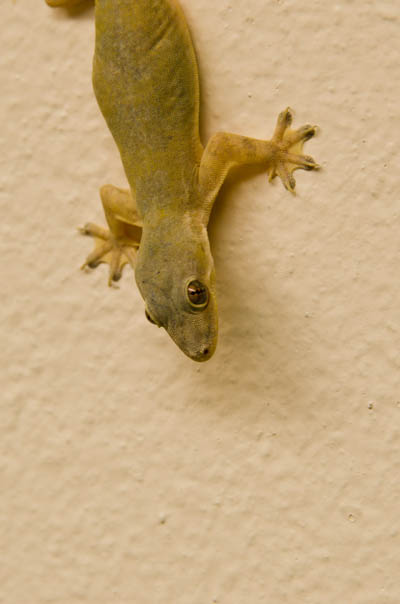
Last Observed: February 2015
Observed By: David Vinot
This small lizard is a member of the gecko family that is know in Thai as a Chingchok. It is the smaller cousin of the Tokay Gecko.
It is probably the most common and widespread lizard in Thailand and wherever you are if you look around the walls and ceiling of the building you are in you will probably see several. They are voracious insect hunters and are extremely useful for getting rid of mosquitoes and other biting insects.
Flat-Tailed House Gecko Wikipedia
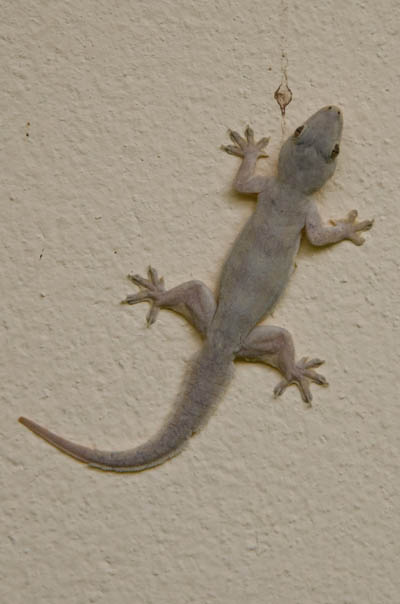
Mountain Horned Dragon (Canthosaura armata)
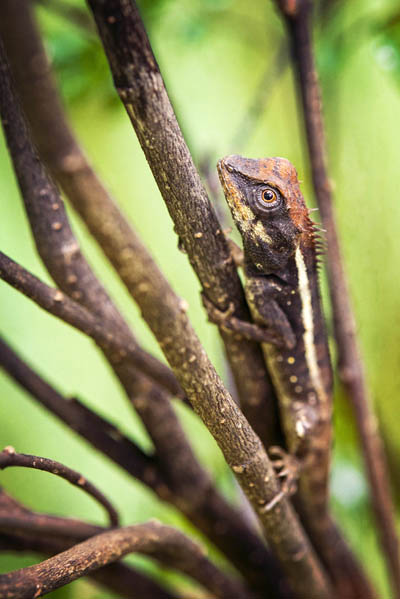
Image Copyright Jonathan Milnes
Last Observed: November 2015
Observed By: Jonathan Milnes
Mountain Horned Dragons, also known as Pricklenape Agamas are a species of lizard with a characteristic set of spikes at the neck.
They are well suited to Koh Chang, preferring a hilly and forested habitat. They live exclusively on insects and consume only live prey.
Acanthosaura Wikipedia


